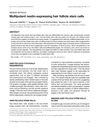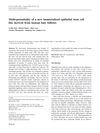 41 citations,
September 2010 in “Journal of dermatological science”
41 citations,
September 2010 in “Journal of dermatological science” Bone marrow and umbilical cord stem cells can help grow new hair.
 41 citations,
January 2007 in “Journal of Korean Medical Science”
41 citations,
January 2007 in “Journal of Korean Medical Science” Minoxidil and ATRA together boost hair growth more effectively than minoxidil alone.
 41 citations,
June 2006 in “Journal of Investigative Dermatology”
41 citations,
June 2006 in “Journal of Investigative Dermatology” Beard and scalp hair cells have different gene expressions, which may affect beard growth characteristics.
 40 citations,
July 2015 in “Journal of Cellular Biochemistry”
40 citations,
July 2015 in “Journal of Cellular Biochemistry” Cysteine helps maintain keratin production in skin cells even when iron is low.
 40 citations,
January 2009 in “Skin Pharmacology and Physiology”
40 citations,
January 2009 in “Skin Pharmacology and Physiology” Fetal cells could improve skin repair with minimal scarring and are a potential ready-to-use solution for tissue engineering.
 40 citations,
January 1994 in “Skin Pharmacology and Physiology”
40 citations,
January 1994 in “Skin Pharmacology and Physiology” Male hormones affect oil-producing skin cells differently based on their body location, and the drug spironolactone can reduce these effects.
 39 citations,
July 2021 in “Stem Cell Research & Therapy”
39 citations,
July 2021 in “Stem Cell Research & Therapy” Using fat stem cells and blood cell-rich plasma together improves healing in diabetic wounds by affecting cell signaling.
 39 citations,
June 2017 in “Scientific Reports”
39 citations,
June 2017 in “Scientific Reports” Different lab conditions and light treatment methods change how human skin cells respond to light therapy.
 39 citations,
August 2016 in “Journal of Dermatological Treatment”
39 citations,
August 2016 in “Journal of Dermatological Treatment” Stem cell therapy may help treat tough hair loss cases.
 39 citations,
January 2015 in “International journal for parasitology/International Journal for Parasitology”
39 citations,
January 2015 in “International journal for parasitology/International Journal for Parasitology” Epidermal keratinocytes start wound healing and inflammation after schistosome infection.
 39 citations,
December 2013 in “Phytotherapy Research”
39 citations,
December 2013 in “Phytotherapy Research” Safflower (Carthamus tinctorius) extract helps hair grow and could be used in hair products.
 39 citations,
June 2013 in “Journal of Cosmetic Dermatology”
39 citations,
June 2013 in “Journal of Cosmetic Dermatology” Herbal extracts and platelet-rich plasma together may help increase hair growth by making certain cells grow more, through specific cell growth pathways.
 39 citations,
March 2009 in “Archives of Dermatological Research”
39 citations,
March 2009 in “Archives of Dermatological Research” Apigenin may help promote hair growth and could treat hair loss.
 39 citations,
July 2007 in “Archives of Pharmacal Research”
39 citations,
July 2007 in “Archives of Pharmacal Research” A tripeptide-copper complex may help hair grow by increasing cell growth and decreasing cell death.
 38 citations,
January 2006 in “Journal of Cellular Biochemistry”
38 citations,
January 2006 in “Journal of Cellular Biochemistry” Researchers isolated a new type of stem cell from mouse skin that can renew itself and turn into multiple cell types.
 38 citations,
June 2005 in “Matrix Biology”
38 citations,
June 2005 in “Matrix Biology” Minoxidil affects collagen-related genes, potentially helping treat fibrosis.
 37 citations,
April 2017 in “npj Regenerative Medicine”
37 citations,
April 2017 in “npj Regenerative Medicine” PDGF signaling is crucial for maintaining and renewing hair follicle stem cells, which could help treat hair loss.
 37 citations,
January 2011 in “Annals of Dermatology”
37 citations,
January 2011 in “Annals of Dermatology” ALA-photodynamic therapy helps reduce acne by causing acne cell death and lowering certain skin protein levels.
 37 citations,
January 2009 in “The Journal of Dermatology”
37 citations,
January 2009 in “The Journal of Dermatology” Hair follicle stem cells can turn into various cell types and help repair nerves.
 36 citations,
February 2017 in “BMC Complementary and Alternative Medicine”
36 citations,
February 2017 in “BMC Complementary and Alternative Medicine” Geranium sibiricum extract helps hair grow and is more effective than minoxidil but can be toxic in high concentrations.
 36 citations,
April 2013 in “Cell and Tissue Research”
36 citations,
April 2013 in “Cell and Tissue Research” Bone-marrow and epidermal stem cells help heal wounds differently, with bone-marrow cells aiding in blood vessel formation and epidermal cells in hair growth.
 36 citations,
March 2011 in “Nature Communications”
36 citations,
March 2011 in “Nature Communications” Cells from a skin condition can create new hair follicles and similar growths in mice, and a specific treatment can reduce these effects.
 36 citations,
December 2002 in “Experimental dermatology”
36 citations,
December 2002 in “Experimental dermatology” Barley extract, specifically procyanidin B-3, can promote hair growth and counteract growth inhibition.
 35 citations,
October 2017 in “Signal Transduction and Targeted Therapy”
35 citations,
October 2017 in “Signal Transduction and Targeted Therapy” Fibromodulin treatment helps reduce scarring and improves wound healing by making it more like fetal healing.
 35 citations,
March 2015 in “Experimental Dermatology”
35 citations,
March 2015 in “Experimental Dermatology” Cells from the base of hair follicles help blood vessel cells survive and grow, which is important for healthy hair.
 34 citations,
May 2012 in “International Journal of Molecular Sciences”
34 citations,
May 2012 in “International Journal of Molecular Sciences” Dieckol from Ecklonia cava may help hair growth and could be a potential hair loss treatment.
 34 citations,
January 2012 in “Journal of Dermatological Science”
34 citations,
January 2012 in “Journal of Dermatological Science” Hydrogen peroxide and monoethanolamine in hair dye can cause dermatitis and hair loss.
 34 citations,
November 2010 in “Development”
34 citations,
November 2010 in “Development” Activating Notch in adult skin causes T cells and neural crest cells to gather, leading to skin issues.
 34 citations,
July 2009 in “Journal of Cell Science”
34 citations,
July 2009 in “Journal of Cell Science” ΔNp63α helps control a protein that stops cancer cells from spreading.
 34 citations,
June 2008 in “In vitro cellular & developmental biology. Animal”
34 citations,
June 2008 in “In vitro cellular & developmental biology. Animal” Scientists created a long-lasting stem cell line from human hair that can turn into different skin and hair cell types.






























